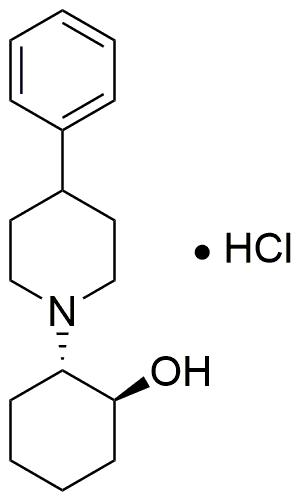D-(+)-Vesamicol hydrochloride is widely utilized in research focused on:
- Neuroscience Research: This compound is often used to study neurotransmitter release and receptor interactions, providing insights into brain function and potential treatments for neurological disorders.
- Pharmaceutical Development: It serves as a valuable tool in drug formulation, particularly in developing medications for conditions like Alzheimer's disease, due to its ability to influence cholinergic signaling.
- Behavioral Studies: Researchers utilize D-(+)-Vesamicol hydrochloride to assess its effects on animal behavior, helping to understand the role of neurotransmitters in cognition and mood.
- Drug Interaction Studies: This compound is used to investigate how various drugs interact with neurotransmitter systems, aiding in the development of safer and more effective therapeutic agents.
- Biochemical Assays: It is employed in various assays to measure the activity of enzymes and receptors, providing critical data for both academic and industrial research.
Informations générales
Propriétés
Sécurité et réglementation
Applications
D-(+)-Vesamicol hydrochloride is widely utilized in research focused on:
- Neuroscience Research: This compound is often used to study neurotransmitter release and receptor interactions, providing insights into brain function and potential treatments for neurological disorders.
- Pharmaceutical Development: It serves as a valuable tool in drug formulation, particularly in developing medications for conditions like Alzheimer's disease, due to its ability to influence cholinergic signaling.
- Behavioral Studies: Researchers utilize D-(+)-Vesamicol hydrochloride to assess its effects on animal behavior, helping to understand the role of neurotransmitters in cognition and mood.
- Drug Interaction Studies: This compound is used to investigate how various drugs interact with neurotransmitter systems, aiding in the development of safer and more effective therapeutic agents.
- Biochemical Assays: It is employed in various assays to measure the activity of enzymes and receptors, providing critical data for both academic and industrial research.
Documents
Fiches de données de sécurité (FDS)
La FDS fournit des informations de sécurité complètes sur la manipulation, le stockage et l’élimination du produit.
Spécifications du produit (PS)
Le PS fournit une description complète des propriétés du produit, notamment sa composition chimique, son état physique, sa pureté et les exigences de stockage. Il détaille également les plages de qualité acceptables et les applications prévues du produit.
Certificats d'analyse (COA)
Recherchez des certificats d'analyse (COA) en saisissant le numéro de lot du produit. Les numéros de lot et de lot se trouvent sur l'étiquette d'un produit, après les mots « Lot » ou « Lot de fabrication ».
Numéro de catalogue
Numéro de lot/série
Certificats d'origine (COO)
Ce certificat d'exploitation confirme le pays dans lequel le produit a été fabriqué, et détaille également les matériaux et composants utilisés et s'il est issu de sources naturelles, synthétiques ou autres sources spécifiques. Ce certificat peut être requis pour les douanes, le commerce et la conformité réglementaire.
Numéro de catalogue
Numéro de lot/série
Fiches de données de sécurité (FDS)
La FDS fournit des informations de sécurité complètes sur la manipulation, le stockage et l’élimination du produit.
DownloadSpécifications du produit (PS)
Le PS fournit une description complète des propriétés du produit, notamment sa composition chimique, son état physique, sa pureté et les exigences de stockage. Il détaille également les plages de qualité acceptables et les applications prévues du produit.
DownloadCertificats d'analyse (COA)
Recherchez des certificats d'analyse (COA) en saisissant le numéro de lot du produit. Les numéros de lot et de lot se trouvent sur l'étiquette d'un produit, après les mots « Lot » ou « Lot de fabrication ».
Numéro de catalogue
Numéro de lot/série
Certificats d'origine (COO)
Ce certificat d'exploitation confirme le pays dans lequel le produit a été fabriqué, et détaille également les matériaux et composants utilisés et s'il est issu de sources naturelles, synthétiques ou autres sources spécifiques. Ce certificat peut être requis pour les douanes, le commerce et la conformité réglementaire.


